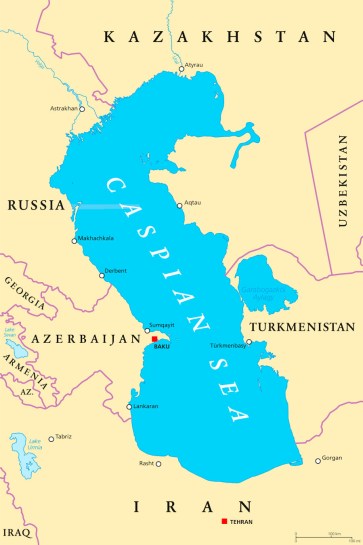Azerbaijan’s Caspian Baku Port To Expand Cargo Traffic Infrastructure & Transshipment
Significant increases of shipping, road and rail transportation necessitate new facilities as Baku booms
Azerbaijan is considering the implementation of numerous projects to boost Baku Ports freight cargo transshipments, Khudayar Gasanli, the Head of Baku Port Strategic Planning and Development has stated.
According to Gansali, the demand for routes running through Azerbaijan is rapidly increasing due to recent world events. “The cargo traffic growth along the East-West Corridor (from China to Europe), the Port of Baku and the Trans-Caspian International Transport Route (TITR), are seeing greater demand. Freight movement from China, Central Asia and the Black Sea basin to the EU countries and back via TITR through Azerbaijan’s territory, has been updated, which means a rise in cargo flows from China to Europe through Azerbaijan.”
Baku has become strategically important as an EU supply chain East. Goods can be shipped via sea from Bulgaria and Romania to ports in Georgia and Turkey, where they are loaded onto rail, and directed to Baku as the main Caspian sea port. To continue to China, they are shipped to Kazakhstan’s Aqtau Port, to Central Asia via Turkmenistan’s Turkmenbashi Port, and to the Middle East, India and South Asia via the INSTC route from Iran’s Anzali Port and onto Bandar Abbas Port on the Persian Gulf. The route is both faster and less expensive than the Suez Canal option.

Gansali added that the Baku International Sea Trade Port, Azerbaijan Railways, Azerbaijan Caspian Shipping Company (ASCO), as well as other cargo carriers, are carrying out monitoring activities to develop Baku’s infrastructure potential. Moreover, the first block chain railway cargo has already passed through Azerbaijan en route from China to Europe. Yet current realities suggest the need for much shorter and more sustainable routes.
“Our country provides for one of the most sustainable freight transport routes. The present capacity Baku Port is 100,000 TEU containers. Hopefully, the transshipment of containers through the port will reach its peak in the next 2-3 years. In the medium term, we will be establishing a special terminal for container handling” Hasanli said.
According to him, there has previously been a downward trend in the transshipment of wagons over the past three years. “However, from January through May 2022, this figure increased compared to the same period of 2021. In the reporting period, the freight flow in the Baku port reached 2.2 million tons, up by nearly 20% against the same period of 2021 (1.8 million tons),” Hasanli said, adding that wheeled vehicles (TIR) transshipment increased by almost 16% up to 17,800 units.
“During this period, Baku Port handled 14,300 railcars (an increase of 18.9%). The main share of the cargo volume falls on containers, as in previous years. The growth in container transshipment accounted for 22%, exceeding 21,000 TEU containers. The bulk cargo and mineral fertilizer traffic is also rapidly growing. A total of 606,000 tons of bulk cargos were transshipped in the first five months of 2022, out of which 558,000 tons (over 90%), were mineral fertilizers. This figure is expected to reach around 1.4 million tons by the end of 2022 (growth of 22.5%)” Hasanli stated.
The Port plans to commission a mineral fertilizer terminal with an annual capacity of nearly three million tons by the end of 2022 – beginning of 2023.
“In our assessment, the Port’s container transshipment will reach 200,000-250,000 TEU per year, while bulk cargo will reach one million tons per year in the medium term. The Port will expand its infrastructure capacities of cargo traffic in conjunction with the railway, shipping company, and road carriers,” Hasanli said.
Türkiye and Central Asian countries transport a large flow of wheeled vehicles. The goods turnover between them, including Afghanistan, reaches about 120,000 TIR per year. About 20% of these cargoes pass through Azerbaijan’s territory, and the Port aims to increase this figure up to 50 % (or nearly 60,000 trucks).
There are also plans to establish a TIR park at Baku Port together with containerization facilities, as well as the construction of terminals for bulk cargo and mineral fertilizer handling.
Currently, the transshipment of wheeled vehicles from Türkiye alone in the first five months of 2022 reached nearly 35,000-40,000 units, an increase of 80% year on year compared with 2021.
Related Reading
About Us
Chris Devonshire-Ellis is the Chairman of Dezan Shira & Associates. The firm assists British and Foreign Investment into Asia and has 28 offices throughout China, India, the ASEAN nations and Russia. For strategic and business intelligence concerning China’s Belt & Road Initiative please email silkroad@dezshira.com or visit us at www.dezshira.com





